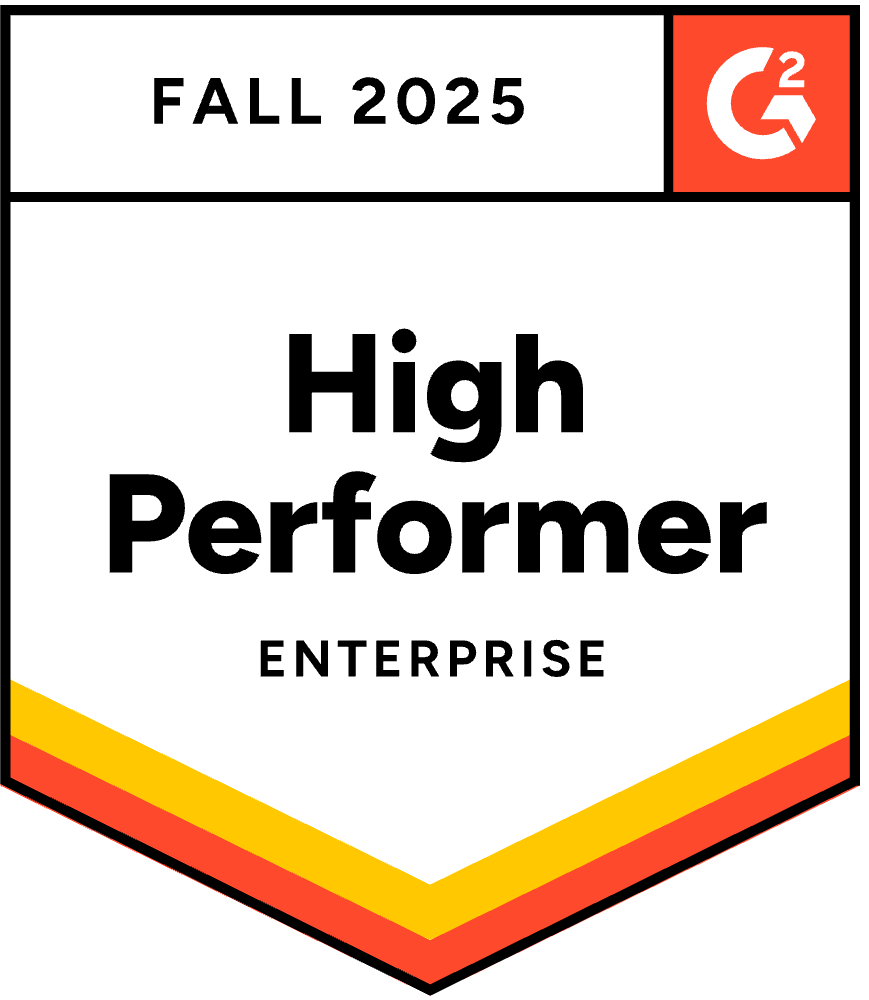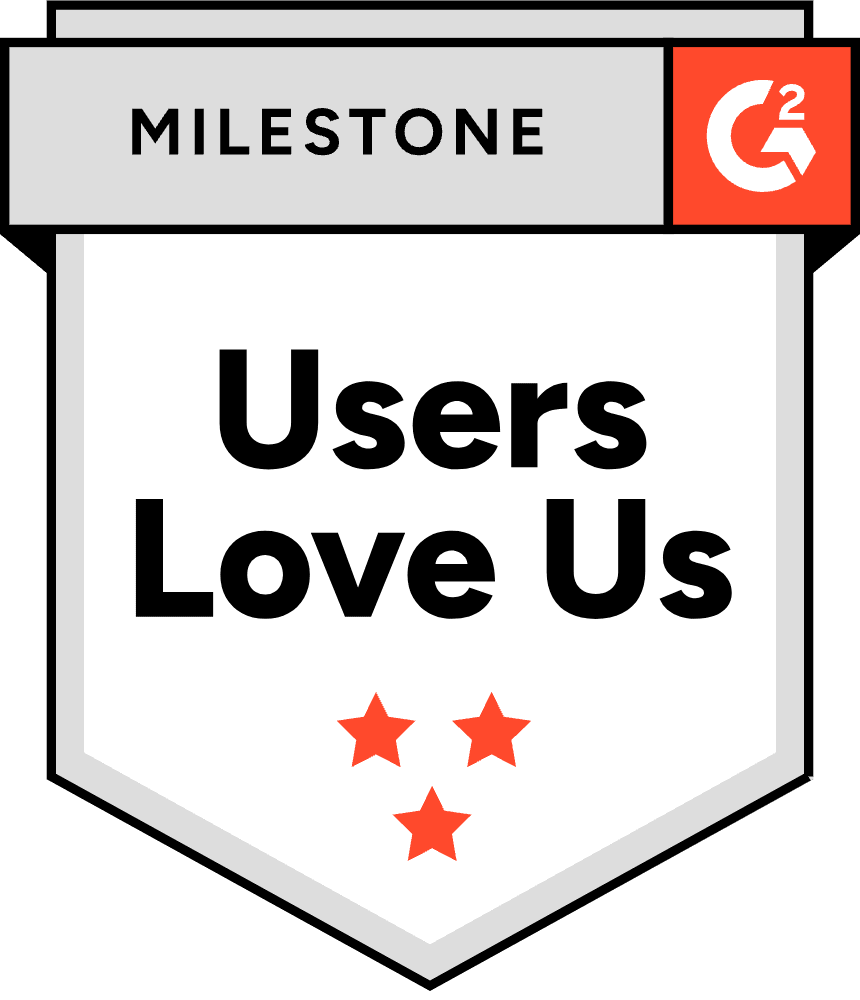Competition heats up as sales teams and marketing teams need every advantage in identifying high-quality prospects to fuel pipeline growth. However, with many data solutions now available, determining the right platform match based on budget, use case priorities and intended adoption proves pivotal. This evaluation compares two leading B2B data providers—ZoomInfo vs RocketReach—across dimensions like key features, data accuracy, custom pricing models and more to guide smart tool selection for your sales and marketing efforts.
ZoomInfo vs RocketReach: At a Glance
Last updated: September 2025
Before diving into detailed comparisons, here’s a quick overview of how ZoomInfo and RocketReach stack up for sales prospecting and lead generation efforts:
| Factor | ZoomInfo | RocketReach |
| Ideal User | Enterprise sales teams, large marketing and sales teams | Small teams, individual sales reps |
| Database Size | Hundreds of millions of contacts, 100M+ companies | Extensive database with hundreds of millions of profiles |
| Data Accuracy | Hybrid AI + human verification team | Multi-step automated SMTP verification for accurate contact information |
| Pricing Model | Custom pricing via annual contracts | Transparent pricing with monthly/annual team plans |
| Killer Feature | Intent data and AI-powered insights | Fast browser extension for contact lookup |
What is ZoomInfo?
ZoomInfo serves as a comprehensive B2B database platform that provides sales teams with extensive company data and intent signals to power sales efforts and marketing campaigns. The platform’s data quality helps professionals identify and engage with high-quality prospects through targeted outreach. Valuable features include intent data monitoring to track companies researching products, technographic data to assess tech stacks and visitor tracking to identify website traffic sources.
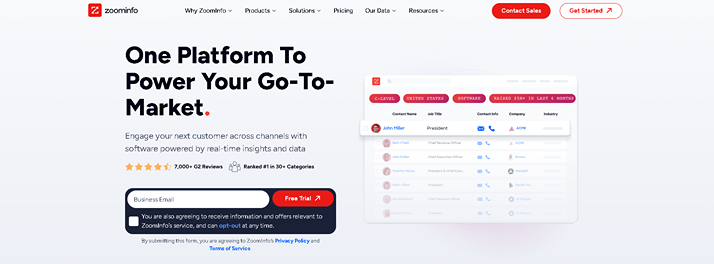
CRM integration capabilities with marketing automation tools allow workflow automation to capture potential decision makers. ZoomInfo’s breadth of up to date data and actionable insights empower businesses to boost productivity, increase revenue and make informed data-driven decisions. With comprehensive database coverage and precision targeting, ZoomInfo sales intelligence is leveraged by various industries for sales enablement, account-based marketing and other use cases vital to business growth.
What is RocketReach?
RocketReach functions as a sales intelligence tool that delivers quick access to an accurate database for lead generation. The easy-to-use interface allows professionals to discover contact details for prospects while browsing LinkedIn and company websites using their Chrome extension. By integrating seamlessly with CRM systems, this lead generation platform helps sales teams and marketing teams manage relationships for long-term success.
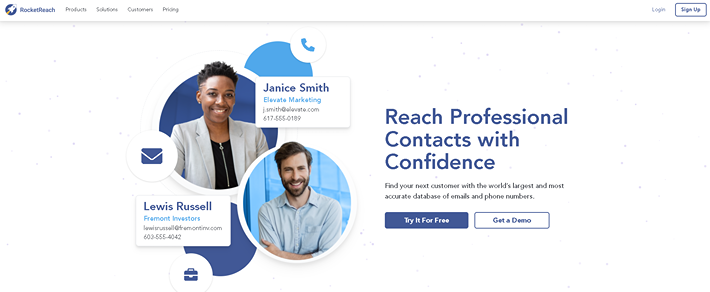
Key use cases span lead generation, intent monitoring, account-based marketing and crisis response. With vast coverage across company and individual contacts globally, RocketReach focuses on fueling productivity and pipeline growth. The tool aims to save time while providing personalized, human-led selling opportunities through enriched contact data and insights for outreach strategies.
ZoomInfo vs RocketReach Comparison Guide
ZoomInfo and RocketReach are leading sales intelligence platforms but target different use cases. While ZoomInfo provides extensive company data and embedded workflows to facilitate enterprise account-based sales and marketing efforts, RocketReach efficiently verifies contact info to enable personalized outreach strategies for individual practitioners and small teams.
What Are the Key Features of Each Platform?
ZoomInfo offers comprehensive enterprise features including AI-powered intent data and advanced workflows, while RocketReach focuses on streamlined contact verification and quick contact lookup capabilities. Understanding differentiation across product capabilities guides smarter alignment between tools and user requirements. This overview contrasts key features, depth of lead data, underlying analytics and customization options.
ZoomInfo Features
ZoomInfo equips enterprises to orchestrate data-driven account engagement powered by depth, automated workflows and analytical intelligence.
- Robust Company and Contact Data: 300+ attributes across millions of companies to enable targeted lead lists
- Data Enrichment: Automated data enrichment and cleaning integrated with CRM systems
- Visitor Tracking: Identifies anonymous website traffic for sales follow-up
- Technographic Data: Assesses companies’ tech stacks for smarter engagement
- Real Time Alerts: Live alerts on trigger events to act quickly
- Advanced Search Filters: Finds company professionals based on sophisticated filters and keywords
- CRM Integration: Embeds data directly into workflow tools
Intent Data and AI: ZoomInfo’s Copilot Features
ZoomInfo Copilot represents a generative AI-powered layer released in May 2024 that transforms how sales teams interact with prospect data. Key capabilities include streaming intent signals providing real time data on prospect research activity and website visits, AI email generator crafting personalized outreach emails, Copilot chat answering specific account questions, account summaries aggregating data overviews, buying groups identifying relevant decision makers within target accounts and live alerts delivering breaking notifications through Slack or CRM systems. The Copilot add-on pricing varies by bundle and seat count according to buyer reports, with ZoomInfo providing custom quotes rather than published list pricing.
RocketReach Features
RocketReach centers on efficient and accurate contact verification to empower personalized outreach for individual sales reps and small teams. Its streamlined interface enables quick searches at scale to fuel human-driven sales conversations.
- Contact Verification: Confirms direct contact info for millions of professionals
- Bulk Lookups: Scalable search for email addresses and phone numbers
- Browser Extension: Enables quick access to profiles while browsing
- Smart Recommendations: Uses lead behavior patterns to suggest relevant contacts
- High Quality Data: Focuses on depth of direct contact data points
- Simplified Experience: User-friendly interface to drive productivity
ZoomInfo caters primarily to larger enterprises that optimize complex revenue engines, while RocketReach targets individual practitioners focused exclusively on verified contact info. ZoomInfo’s comprehensive database encompasses 300+ company attributes and technographic details on millions of companies, facilitating advanced search filters for nuanced segmentation using dimensions unavailable within RocketReach. ZoomInfo also provides embedded workflows and augmented intelligence like visitor tracking and predictive intent signals oriented around account engagement.
Meanwhile, RocketReach concentrates on accurately confirming contact data for personalized messaging regardless of company or technological context. Its streamlined interface and productivity accelerators aim to remove barriers to rapid human outreach. So while ZoomInfo enables automation and enhancement for enterprise marketing campaigns, RocketReach gives individuals trigger-ready data to fuel one-to-one selling supplemented by personal rapport building. The sales acceleration tools align on the importance of accurate data yet differentiate across ideal use cases between programmatic precision and accessible simplicity.
Head-to-Head Test: Finding 10 Qualified Leads in 5 Minutes
To understand the practical differences between ZoomInfo vs RocketReach, I conducted a real-world test using both platforms to find 10 qualified leads in 5 minutes. The ideal customer profile targeted ‘Marketing Managers’ in ‘Software’ industry in ‘California’ at companies with ’50-200 employees’.
ZoomInfo Test Results: Using ZoomInfo’s advanced filters, I applied the basic criteria then layered on technographic filters like ‘uses HubSpot’ and intent data showing companies researching CRM solutions. The platform’s 65+ search filters allowed for precise targeting, generating 847 results. I selected the top 10 prospects based on intent signals and recent activity. The entire process took 4 minutes and 20 seconds, with high-quality data showing active buying signals.
RocketReach Test Results: RocketReach’s streamlined search interface made it easy to apply the basic demographic filters. However, the platform lacks advanced technographic and intent data filters. The search returned 1,200+ results, requiring manual review to identify the most relevant prospects. Using the browser extension to verify contacts from LinkedIn took 5 minutes and 15 seconds, slightly exceeding the target time but delivering verified contact information.
Key Takeaway: ZoomInfo excels at identifying high-intent prospects through sophisticated filtering, while RocketReach provides faster contact verification once you’ve identified your targets through other means.
How Accurate and Comprehensive Is the Data?
ZoomInfo provides more comprehensive company data and technographic data with hybrid verification methods, while RocketReach focuses specifically on contact data accuracy through automated verification processes. When choosing a sales intelligence platform, evaluating the data foundation across dimensions like accuracy, coverage and reliability proves imperative. This analysis examines how ZoomInfo and RocketReach compare in terms of their data capabilities.
ZoomInfo Data Foundation
ZoomInfo fuels enterprises with expansive intelligence to illuminate accounts, accelerate sales cycles and sharpen targeting. Robust processes blend public and proprietary sources for accuracy and depth tailored to segmentation needs.
- Sources: Combines web scraping, partnerships, user contributions and dedicated in-house company research tools for quality breadth
- Coverage: Includes hundreds of millions of professional profiles and company records globally, with contact details, phone numbers, company data, technographic data, demographics and buying intent
- Reliability: Uses AI, ML and data scientists for ongoing monitoring, change tracking and multi-layer verification
RocketReach Data Foundation
RocketReach gives individuals rapid access to verified contacts, enabling swift personalized engagement. The streamlined sourcing concentrates exclusively on compiling key email, phone and social contact points.
- Sources: Leverages user contributions, publicly available data and third-party providers to enable comprehensive database access
- Coverage: Focuses specifically on direct contact points like emails, phone numbers and social handles across millions of individuals and companies
- Reliability: Regularly updates data but provides limited transparency into verification processes
How is Contact Data Verified?
ZoomInfo uses a hybrid approach combining AI with a 300+ person human research team and provides internal data quality scores (A+, A, B) for each contact record. This multi-layered verification includes real time monitoring, change tracking and continuous validation against multiple data sources.
RocketReach employs an automated, multi-step process including syntax check, domain validation and mailbox verification through SMTP protocols. The platform also incorporates user contributions to improve data accuracy over time, though it provides less transparency into specific verification methodologies compared to ZoomInfo.
Clear differences emerge when contrasting the data capabilities between ZoomInfo and RocketReach. ZoomInfo takes a broad, 360-degree approach by combining extensive publicly available data aggregation with proprietary in-house research to fuel company data, technographic and intent-based datasets spanning hundreds of millions of professional and company profiles globally. This robust sourcing enables greater depth and breadth of coverage for enterprise use cases. ZoomInfo also dedicates AI, ML and data science resources to multilayered monitoring and verification protocols for reliability.
In contrast, RocketReach deliberately focuses on doing one thing well: compiling accurate and exportable direct contact points like emails, phone numbers and social handles for millions of individuals. The streamlined data process concentrates on core contact elements sought by sales reps pursuing personalized outreach strategies. While both leverage publicly available data and user contributions, ZoomInfo’s blended approach unlocks more expansive signals tailored for segmentation and precise targeting behind high-value accounts. However, RocketReach offers self-service access to verified contacts outside of complex system implementation. Determining the ideal fit depends on current scale, growth ambitions and intended data application within existing tech stacks.
Overall, ZoomInfo excels in the comprehensiveness of its data foundation, spanning depth and reliability factors vital for sales and marketing use cases. In contrast, RocketReach deliberately focuses data efforts directly on contact points for targeted outreach.
How Do ZoomInfo and RocketReach Integrate with Your Workflow?
ZoomInfo offers deep, automated, bi-directional integrations for enterprise workflows, while RocketReach focuses on simple data exports and flexible connections through tools like Zapier. Integrations extend the value of sales and marketing platforms by connecting data insights to downstream workflows. Evaluating integrations enables businesses to determine which tools can seamlessly embed within existing technology stacks. This analysis examines how the native integrations available in ZoomInfo and RocketReach compare for workflow automation.
ZoomInfo Integrations
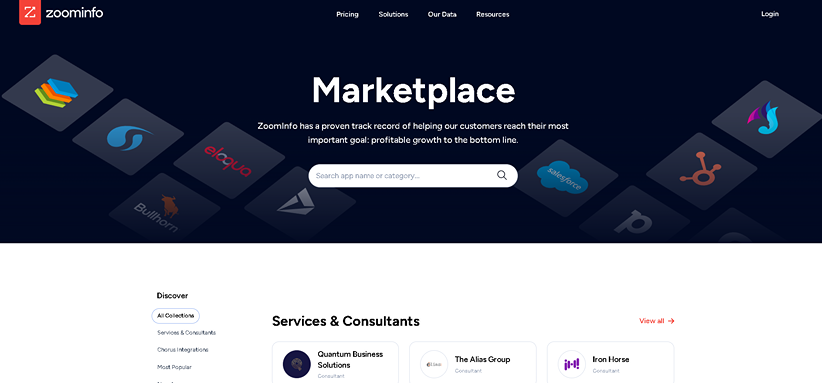
ZoomInfo amplifies existing infrastructure through embedded activations across foundational CRM systems, marketing automation tools, sales and collaboration tools. The native integrations focus on bi-directional contact and account enrichment to minimize manual data wrangling.
- CRM Integration: Direct data sync with Salesforce, Microsoft Dynamics and HubSpot CRM for in-platform contact and account enrichment
- Marketing Automation Connectivity: Tight links with HubSpot, Marketo, Oracle Eloqua and Drift for campaign optimization
- Sales Engagement Alignment: Outreach, SalesLoft, Groove and Conversica integrations to align sequencing with buyer insights
- Collaboration Enablement: Real time alerts, tasks and notifications available in MS Teams, Slack, Gmail and Office 365
RocketReach Integrations
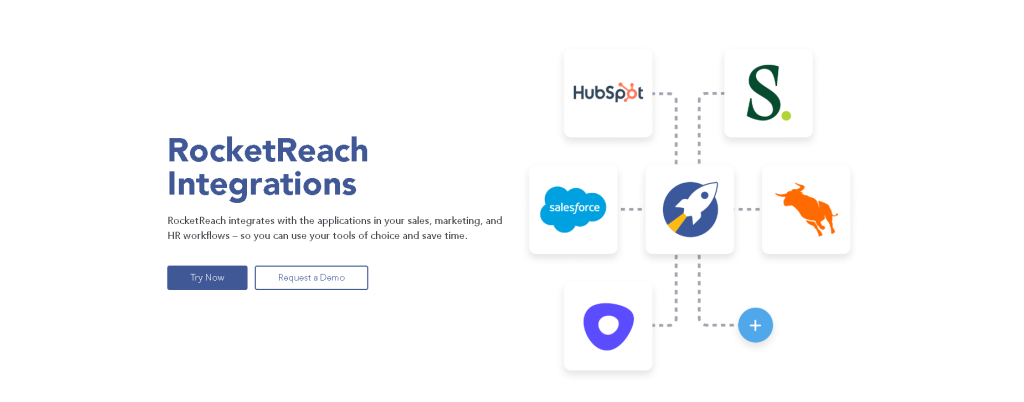
RocketReach offers lightweight, configurable integrations oriented around flexible batch contact and intent data exports. The streamlined approach provides individuals broader customization outside ecosystems through spreadsheet or Zapier flows.
- CRM Systems Transfer: Exports contacts directly into Salesforce, HubSpot CRM and Zoho CRM for access outside RocketReach
- Digital Workflows: Leverages Zapier to connect RocketReach lead data with over 1,000 downstream apps, including LinkedIn, Gmail and Calendly
- Spreadsheet Export: Enables export of contacts into Excel and Google Sheets for offline analysis and synchronization
When analyzing the integration capabilities offered by ZoomInfo and RocketReach, clear strategic differences emerge in their approaches. ZoomInfo enables robust native and embedded integrations into foundational platforms like CRM systems, marketing automation tools, sales engagement software and collaboration tools. This allows for seamless, bi-directional syncing so that enriched contact and company data can flow seamlessly to augment workflows without manual exporting or importing across systems. ZoomInfo’s emphasis lies in enhancing existing infrastructure utility through embedded activations.
In contrast, RocketReach concentrates its integration strategy on flexible detailed insights exportability through batch spreadsheet transfer or custom connections configured via Zapier. There’s less focus on establishing deep, native syncs or automatic enrichments to minimize complexity. While both platforms offer some CRM integration, RocketReach interactions lean more toward standalone exporting rather than enabling actual data augmentation within the systems. Determining the ideal approach depends on whether immediate control over exported contact batches or integrated automated enhancement aligns better with existing pipelines. ZoomInfo embeds natively while RocketReach exports freely.
The ideal choice comes down to use case needs between comprehensive native integrations or streamlined exports complemented by Zapier’s custom connections.
How Easy Are These Platforms to Use?
ZoomInfo requires significant training but offers extensive customization for enterprise workflows, while RocketReach prioritizes immediate usability with minimal learning curve for individual users. Ease of use and seamless workflow integration prove pivotal to user adoption of any new platform. ZoomInfo and RocketReach approach usability differentiation across factors like interface design, customization capabilities and speed of implementation.
ZoomInfo Usability
ZoomInfo offers expansive customization and functionality catering to sophisticated usage and complex workflows. However, significant ramp-up time is required to navigate the vast range of capabilities before users achieve long-term versatility.
- Intuitive Dashboard: Well-organized home screen provides quick access to core features and actionable insights
- High Customization: Granular search, automated workflows and alert customization to meet specific use cases
- Steep Learning Curve: Wide range of capabilities requires more onboarding but offers long-term versatility
- Slower Implementation: Full platform integration is robust but complex, relying on extensive support resources
RocketReach Usability
RocketReach prioritizes lightweight self-service adoption by constraining feature scope to focus on rapid database lookup and export. This simplicity enables first-time users to integrate streamlined functionality quickly but may pose scalability constraints for larger teams.
- Simplified Functions: Clear, limited menu options aimed at enabling fast contact lookups
- Light Customization: Some search preferences are available but have lighter capabilities compared to ZoomInfo
- Low Learning Curve: Core features are easily understandable for most first-time users
- Rapid Implementation: Limited use cases allow for quick integrations focused on contact data syncing
The prime differentiator comes down to the tradeoff between sophistication and simplicity. ZoomInfo prevails in customization and functionality while RocketReach wins on lightweight, self-service workflows. Alignment to existing team skill sets can guide the ideal choice.
What Do Real Users Say? A Deep Dive into G2 & Reddit Reviews
User reviews reveal that ZoomInfo users praise comprehensive data but complain about custom pricing and contract terms, while RocketReach users appreciate simplicity but note limitations in advanced features. Analyzing real user feedback provides crucial insights into how these platforms perform in practice.
G2 Review Summary
Based on G2 reports as of September 2025, ZoomInfo maintains strong ratings and is lauded for high quality data and intent features but criticized for high cost and long-term contracts. Users consistently mention the platform’s comprehensive database and advanced search filters as major strengths while contract inflexibility and aggressive auto-renewal clauses are frequent complaints.
RocketReach maintains solid user ratings with users praising its Chrome extension ease and quick contact verification. However, reviewers note the smaller database compared to enterprise alternatives and credit usage model as potential drawbacks for high-volume users.
Reddit User Sentiment
Reddit users in r/sales frame the choice as a trade-off between cost and functionality. ZoomInfo is often recommended for enterprise teams with substantial budgets who need comprehensive account intelligence while RocketReach gets recommended for startups and individual contributors focused on basic contact lookup. Common themes include frustration with ZoomInfo’s contract terms (with some users reporting auto-renewal issues) and appreciation for RocketReach’s transparent pricing model.
What Are the Pricing Models and Hidden Costs?
ZoomInfo requires annual contracts with custom pricing starting around enterprise levels with additional fees for users and credits, while RocketReach offers transparent pricing starting at $36 per month with clear team plans. Evaluating and contrasting the pricing plans between ZoomInfo vs RocketReach reveals significant differentiation in intended buying audiences.
ZoomInfo Pricing
ZoomInfo offers various pricing plans designed to cater to different business needs, focusing on providing robust prospecting tools and a comprehensive customer contact database. Pricing for ZoomInfo is quote-based with annual contracts only, making it challenging for smaller teams to budget effectively.
ZoomInfo has three main tiers with typical quotes reported by buyers ranging from mid to high five figures annually:
- Professional Plan: Entry-level enterprise option offering bulk credits and limited users. Additional users incur per-seat fees with volume discounts available.
- Advanced Plan: Mid-tier option with increased bulk credits and monthly user credits. Higher per-user fees with similar discount structures for larger teams.
- Elite Plan: Top-tier option with maximum bulk credits and monthly credits per user. Includes most features and add-ons with consistent per-user pricing model.
ZoomInfo Hidden Costs
Beyond the base subscription, ZoomInfo users often encounter additional fees including extra user licenses, additional data credits when annual allocation is exhausted, global data access fees for international contacts and premium feature add-ons like advanced intent data or enhanced technographics. These hidden costs can significantly increase total cost of ownership, sometimes doubling initial quotes. Buyers also report concerns about auto-renewal clauses in contracts.
RocketReach Pricing
RocketReach embraces transparent, consumption-driven pricing tailored to needs, from personal usage to departments. The platform offers both monthly and annual billing options with significant savings for annual commitments and flexible pricing for different company size needs.
- Essentials Plan: $36-$48 per month (billed annually) includes unlimited personal and professional emails, 1200 exports and browser extension. Adding phone numbers increases cost to approximately $63/month.
- Pro Plan: $108-$126 per month (billed annually) includes unlimited mobile and direct numbers, 3600 exports and technographic search capabilities
- Ultimate Plan: $249 per month (billed annually) adds API access and Salesforce integration for advanced users with higher credit usage limits
Monthly billing costs significantly more than annual rates but RocketReach provides clear pricing without hidden fees or surprise charges, making it easier for teams to budget and scale their credit usage predictably. The RocketReach pricing model focuses on transparency compared to enterprise custom pricing approaches.
ZoomInfo vs RocketReach: Pros and Cons
ZoomInfo and RocketReach align in prioritizing accurate data but diverge in areas of focus, integration and analytics. Understanding their respective strengths and limitations facilitates smarter alignment to business needs for lead generation efforts.
ZoomInfo Pros and Cons
ZoomInfo stands out for its unrivaled data foundation and built-in business intelligence spanning predictive alerts to visitor tracking. Yet sophisticated capabilities come with steeper learning curves and rigid access presenting barriers for smaller teams.
Pros:
- Comprehensive Data Foundation: Unmatched depth and breadth of company and contact enrichment with intent signals
- Sophisticated Capabilities: Advanced features spanning alerts, visitor tracking, technographic data and more for marketing efforts
- Embedded Ecosystem Integrations: Native CRM systems, marketing automation tools and collaboration enablement
Cons:
- Steep Learning Curve: Full gamut of capabilities requires more training and skill development
- Custom Pricing Barriers: Opaque pricing presents barriers to entry for small and large businesses with limited budgets
RocketReach Pros and Cons
RocketReach simplifies contact verification with intuitive interface, yet uncompromising focus on efficient data confirmation comes at the expense of company insights, automated workflows and scalability for larger sales teams.
Pros:
- Pinpointed Contact Verification: Uncompromising focus on email, phone and social confirmation for targeted lead lists
- Intuitive Experience: Streamlined interface accelerates individual productivity and saves time
Cons:
- Narrow Scope: Limited data context beyond contacts hinders relationship insights and lead behavior analysis
- Constrained Scalability: Gaps in automation and customization create growing pains for expanding teams
Data Governance and Compliance
Both platforms address data privacy and compliance requirements but take different approaches to governance. ZoomInfo maintains comprehensive compliance programs including GDPR, CCPA and SOC 2 Type II certifications with detailed opt-out mechanisms and data provenance tracking. The platform provides transparency into data sources and collection methods through its trust center and privacy documentation.
RocketReach offers basic compliance features and opt-out capabilities but provides less detailed documentation about data governance processes. Teams in regulated industries or those requiring detailed audit trails may find ZoomInfo’s compliance posture more comprehensive for their needs.
How Do They Stack Up Against Lusha?
Lusha emerges as a middle-ground alternative that balances ZoomInfo’s enterprise features with RocketReach’s simplicity, offering strong GDPR compliance and user-friendly design. When comparing B2B data providers, Lusha frequently appears as primary alternative worth considering for sales prospecting.
ZoomInfo targets enterprise and large mid-market companies with comprehensive Go-To-Market platform features and Copilot AI providing predictive pipeline analysis and real time intent signals. However, it requires enterprise-focused annual contracts with custom pricing. Lusha targets small teams and individual sales reps with simplicity and user-friendly browser extension, maintaining smaller but focused database compared to ZoomInfo’s extensive database. Lusha offers AI recommendations and email assistant features with flexible pricing starting around $29-$37/user/month for Pro tier and $51-$60/user/month for Premium tier.
The core trade-off exists between ZoomInfo’s powerful, complex, expensive ecosystem and Lusha’s agile, affordable focused toolset. RocketReach sits between them with extensive database coverage but less sophisticated features than either alternative. For teams seeking comprehensive enterprise features, ZoomInfo leads. For those prioritizing ease of use and compliance, Lusha excels. For pure contact lookup volume, RocketReach offers broad coverage with limited free access options.
ZoomInfo vs RocketReach: The Bottom Line
Defining intended use cases proves imperative for cost-effective ROI when choosing between sales intelligence platforms. Companies with sophisticated workflows will maximize ZoomInfo’s advanced analytics and cold calls capabilities while individual practitioners benefit from RocketReach’s fundamental contact verification for outreach efforts.
Choose ZoomInfo for Scaled Business Impact
For sizeable revenue targets, ZoomInfo empowers comprehensive data modeling, CRM integration augmentation and workflow automation required for enterprise-grade pipeline velocity and sales productivity. The breadth of reconnaissance context facilitates nuanced market segmentation and messaging personalization at scale for marketing campaigns and sales efforts.
Choose RocketReach for Personalized Outreach Efficiency
RocketReach lets entrepreneurs, freelancers and extroverted closers quickly build targeted contact and email lists and engage via preferred mediums with context-limited point solutions. The uncomplicated interface removes friction when executing personalized high-touch selling supplemented by first-party data gathering for targeted outreach.
The contrast highlights how aligned technology, talent and objectives shape positive ROI. Teams should choose what complements existing strengths.
Who Should NOT Buy These Tools?
ZoomInfo isn’t suitable for very small teams (under 5 people) with limited budgets, individual freelancers, or companies requiring month-to-month flexibility. The platform demands significant time investment and technical resources that smaller operations often can’t justify.
RocketReach may not fit large enterprises needing advanced lead behavior analytics, extensive technographic data, automated workflows or complex org charts mapping. Teams requiring deep account intelligence beyond basic contact details will find the platform limiting for comprehensive sales efforts.
Neither Tool a Good Fit? UpLead is the Ultimate Alternative
ZoomInfo over-indexes on sophistication with enterprise custom pricing misaligned for mid-market buyers. Meanwhile, RocketReach’s scope, customization and scalability constraints pose growth hurdles. UpLead offers compelling blend of best-of-breed attributes. Its 95% guaranteed data accuracy rivals ZoomInfo coverage while real time confirmation delivers on RocketReach verification guarantees. Advanced yet intuitive features span predictive intent and CRM systems embedding, which is absent in RocketReach, at more accessible flexible pricing than ZoomInfo’s rigid tiers. Combined accuracy, scalability and usability without sacrifices make UpLead appealing option for organizations striving to augment, not bloat, partner ecosystems. Try UpLead’s free trial today to experience the complete feature set for your lead generation platform needs.
Key Takeaways: ZoomInfo vs RocketReach
- Budget and Team Size: ZoomInfo requires enterprise budgets and dedicated resources while RocketReach offers affordable transparent pricing for individual users and small teams
- Data Depth vs Simplicity: ZoomInfo provides comprehensive company data, technographic data and intent signals while RocketReach focuses exclusively on accurate contact information verification
- Integration Philosophy: ZoomInfo embeds natively into existing workflows and CRM systems while RocketReach prioritizes easy exports and API access through third-party connections
- Use Case Alignment: Choose ZoomInfo for enterprise account-based marketing and complex sales processes; choose RocketReach for straightforward contact lookup and targeted outreach campaigns
FAQs About RocketReach vs ZoomInfo
Below are a few of the most frequently asked questions about RocketReach and ZoomInfo for sales prospecting.
RocketReach typically works better for small teams due to transparent pricing, minimal learning curve and focus on contact verification. ZoomInfo requires enterprise budgets and dedicated resources that smaller teams often can’t justify for basic lead generation efforts.
RocketReach maintains solid data accuracy through multi-step SMTP verification and user contributions. While it may not match ZoomInfo’s comprehensive verification methods, it provides reliable contact information sufficient for most sales prospecting and outreach strategies.
ZoomInfo offers comprehensive intent data and buying signals through its platform, while RocketReach provides limited intent monitoring capabilities. Teams needing advanced lead behavior analysis and intent signals should consider ZoomInfo, while those focused purely on contact verification can rely on RocketReach.
What You Need to Remember About ZoomInfo vs RocketReach
When aligning sales solutions to objectives, one size rarely fits all. ZoomInfo prevails where breadth and depth of data enrich CRM systems ecosystems for segmentation at scale. Meanwhile, RocketReach’s simplicity empowers personal outreach velocity if context beyond contacts proves unnecessary. In both cases, UpLead presents alternative balancing sophistication and usability. Carefully weighing strengths to needs streamlines adoption while minimizing wasted spend. However, investing in aligned technologies, processes and personnel ultimately determines transformational growth potential for sales teams and marketing efforts.



